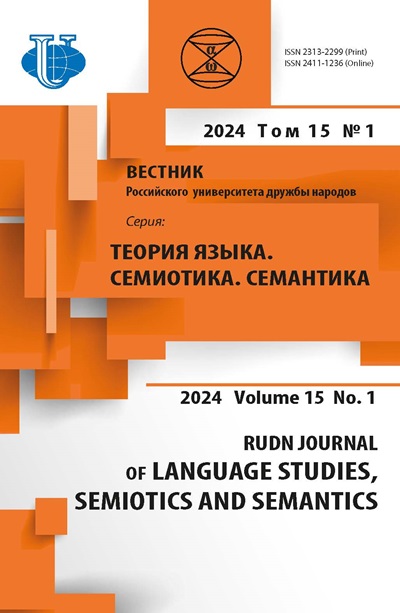A CLASSIFICATION OF ENGLISH UNCOUNTABLE NOUNS
- Authors: Kostromin A.B1
-
Affiliations:
- RUDN University
- Issue: Vol 8, No 3 (2017)
- Pages: 614-619
- Section: Articles
- URL: https://journals.rudn.ru/semiotics-semantics/article/view/17022
- DOI: https://doi.org/10.22363/2313-2299-2017-8-3-614-619
Cite item
Full Text
Abstract
The article studies the classification of uncountable English nouns. The topic is described largely both in grammar manuals and research works. However, it may be presented in more details. In the typological perspective English is not just an analytical language. It certainly demonstrates some features of an isolating language. Unlike such languages as French, German or Italian, it lacks the grammatical gender and that is the cause of a different ground for the classification of English nouns. They are divided into classes according to the way the things exist - either as separate single units forming quantities or some continuity with no definite limits both material and mental. This is the guideline to a more detailed description of countable and uncountable nouns. The analytical character of English also implies that noun classifiers are not imbedded into a noun in its basic form, but are either a separate root morpheme (article a) or are not expressed at all. That differs much from grammatical gender which is a permanent attribute of a noun. The initial class of a noun is not fixed and can change depending the meaning and context. A balance of those two factors determines the shift from being a countable noun to the opposite status and vice versa. That’s why a synthetic language speakers face a difficult task of mastering the English article and a detailed classification uncountable nouns may help them a lot. A statistical analysis of the word death which is both countable and uncountable was made to show the prevailing usage.
About the authors
Alexey B Kostromin
RUDN University
Email: costromin@yandex.ru
Kostromin Alexey Borisovich, PhD, associate professor in the Department of Foreign Languages, RUDN University; Interests: theory of language, comparative linguistics Mikluho-Maklaya str., 6, Moscow, Russia, 117198
References
- Barmina, L.A. & Verkhovskaya, I.P. (2000). An English Training Course. Moscow: ASTREL- AST.
- Hornby, A.S. (1995). Oxford Advanced Learner’s Dictionary. UK: Oxford University Press.
- Murphy, R. English Grammar in Use. A self-study reference and practice book for intermediate students. 2ed. UK: Cambridge University Press.
- The Centre for Translation Studies. URL: http://corpus.leeds.ac.uk/itweb/htdocs/Query.html. (accessed 19.04.2017).
- The Corpus of Historical American English. URL: http://corpus.byu.edu/coha (accessed 19.04.2017).
- Levin M. Is “evidence” used in the plural? The English Language Blog. URL: https://blogg.lnu.se/ english-language-blog/blog/magnus/is-evidence-used-in-the-plural (accessed: 19.04. 2017).













